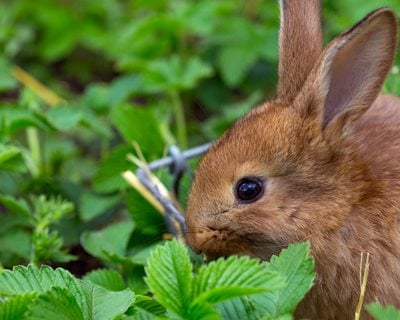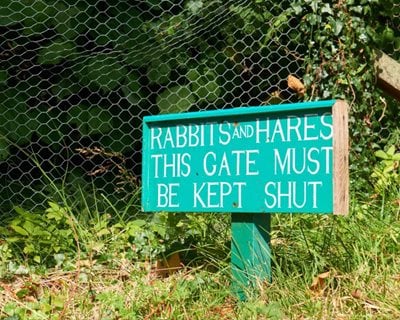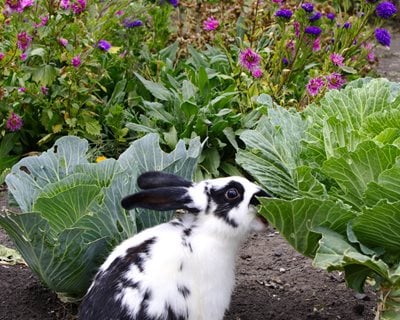RABBITS - NATURAL WAYS TO PROTECT YOUR GARDEN
All-natural ways to keep these cute little critters from devouring your garden’s plants.
Photo by: BBA Photography / Shutterstock.
Seeing a rabbit hop through a garden, nibbling on crops is an adorable sight…unless that garden is your garden and that carrot is one you planted. Unfortunately for gardeners, rabbits happen to like lots of the same veggies we do—and even some of our non-edible plants.
8 WAYS TO KEEP RABBITS OUT OF YOUR GARDEN

Photo by: Duncan Andison / Shutterstock.com
The most important thing to do when addressing a rabbit problem in your garden is to start early before rabbits deem your outdoor space a great place to hang out. Here are some humane, non-toxic ways to keep rabbits away from plants in your garden (in no particular order).
- Add physical garden barriers. If you’ve read Beatrix Potter’s The Tale of Peter Rabbit, you know that a picket fence isn’t going to do the trick when it comes to keeping rabbits out. Use chicken wire with 1-inch mesh or smaller to create a fence around your garden or garden beds. If you do this, keep in mind that rabbits are diggers, so you’ll need to dig down a little so that the chicken wire is at least 6 inches below the ground level. Check your barriers often for holes or signs of nibbling. Motion-activated sprinklers are another barrier that gardeners have used to surprise rabbits and send them running.
Learn how to build a critter-resistant vegetable garden with these plans from Karen Chapman, of Le Jardinet Designs. - Protect individual plants. If you have a few smaller plants that need protection, you can protect them individually with chicken wire or plant cages. For larger woody shrubs and trees, rabbits can do the most damage in winter. They’ll often gnaw on bark, completely encircling the trunk, which can cut off the flow of water and nutrients within the plant or tree. Expandable trunk protectors can help keep your trunks safe, but note—they may need to be adjusted for snow levels. As snow accumulates, rabbits can reach higher and higher up the trunk and into the branches. Repellents can also be applied and come in granular and spray forms.
- Include plants rabbits don't like. If you have to make do without a fence, it’s important to know what to plant to keep the rabbits away from flowers and other plants. Although rabbit-proof plants don’t exist, there are some that rabbits don’t like because of their strong scents such as basil, garlic, rhubarb, hot peppers, spicy basil, and mint. Some gardeners say that marigolds keep rabbits out of their gardens, while others say rabbits actually like the marigolds they planted. In fact, as Theresa Rooney notes in The Guide to Humane Critter Control, young rabbits “will sample and eat many plants that their parents would not touch. Baby bunnies just aren’t smart enough, yet, to know which plants they should eat and which plants they should not.” Resolving your rabbit problem may be a matter of trial and error and switching things up—over time, rabbits can become accustomed to a plant’s smell, making that plant useless as a deterrent. See suggestions below for other plants rabbits dislike to find out what works for your garden.
- Remove potential nesting spots. A female rabbit can have more than 10 babies in a litter, so if you don’t want rabbits in your yard, the last thing you want is to unintentionally create the perfect nesting site for a female rabbit. They nest in overgrown and grassy areas, so try to keep your garden free from those types of spots. With that said, it’s important to note that if you do find a rabbit’s nest, don’t attempt to remove it. Call your local animal control to find out what to do so that you don’t harm any rabbits.
- Add visual deterrents. Though some gardeners say placing things in your garden to scare rabbits away won’t work, others swear by their success. Here are some to try: Metal pinwheels (their movement, shininess, and even sound frighten some rabbits); rubber snakes; and owl statues. Another option is to run twine between two stakes and tie strips of aluminum foil to the twine. If you do try these deterrents, we recommend moving them around your garden frequently to prevent the rabbits from getting used to seeing them in the same spot.
- Elicit the help of predators. Dogs and cats are great at deterring rabbits and other garden pests. So if you’ve been trying to convince your housemates that you need one, “garden protector” is just another great reason to add to the list! But if that’s not possible, just trick the local rabbits into thinking you do have a dog or cat. Ask your local groomer for dog and cat hair then stuff it into a burlap bag or pantyhose and place it around your garden so the scent tricks rabbits into thinking there’s a predator nearby. The hair will need to be replaced every so often, especially after it rains.
- Create your own spray. There are lots of homemade spray recipes available online, and many of them include cayenne pepper, as rabbits dislike the pungent smell. Here’s one recipe to try:
- Mix 2 tablespoons of cayenne pepper, 2 tablespoons of garlic powder, 1 teaspoon of pure-castile liquid soap, and five cups of water.
- Pour into a spray bottle and shake to combine the ingredients.
- Spray plants rabbits usually nibble on.
- Try other home remedies. Gardeners are a savvy bunch who have tried a host of ideas to keep rabbits out of the garden, and here are a couple of them: Cut up or shred a bar of Ivory or Irish Spring soap (rabbits dislike the scent), wrap it in cheese cloth, attach it to a stake, and place it around the garden. Lightly sprinkle black pepper, crushed red pepper, or garlic powder in your garden beds, being sure to reapply after a few weeks or after it rains.
EDITOR'S NOTE: Do your research! In online gardening forums, we’ve seen gardeners recommend moth balls as a method for keeping rabbits away, but please—do not put them in your garden! They are toxic and poisonous when ingested.
RABBIT-RESISTANT PLANTS

Photo by: HGalina / Shutterstock.com
Because rabbits will eat just about anything and they will adapt and adjust to what's available, it's hard to classify any plant as truly rabbit proof. However, there are plants that they simply don't prefer. Keep in mind, there can be some trial and error involved in finding what works in your garden, as a plant that works great for your neighbor might be considered a delicacy in your garden. Here are some plants to try that are known to be their least favorites:
- Catmint
- Butterfly bush
- Clematis
- Coral Berry
- Deutzia
- Juniper
- Lilac
- Rose of Sharon
- Spirea
See more on rabbit-resistant plants.
DO I HAVE A RABBIT PROBLEM?
Rabbits are crepuscular, meaning they are mostly active during dawn and dusk. So if you haven’t actually caught them in the act of destroying your carefully planted crops, here are some signs they’ve been in your garden:
- You’ve spotted pea-sized droppings
- Plants look like they’ve been trimmed with pruners rather than nibbled on (rabbits have upper and lower incisors)
- Young, tender plants have disappeared
- You find tufts of hair or spots where it looks like a small animal has been digging
- Drip lines or hoses have been chewed on
- Something has been gnawing on bark around tree trunks or woody plants.
RELATED:
The Best Deer-Resistant Plants for Your Garden
How to Keep Squirrels Out of Your Garden
How to Get Rid of Voles in Your Garden
How to Keep Gophers Out of Your Yard and Garden


